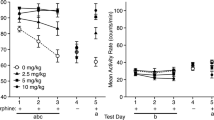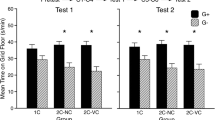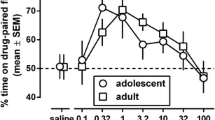Abstract
Rationale and objective
Effects of corticosterone on place conditioning to ethanol were investigated in mice using two conditioning schedules; the conventional method and a rapid conditioning schedule in which exposure to the CS+ followed immediately on exposure to the CS–.
Methods
Effects of administration of corticosterone, 10 mg/kg, on the acquisition of place conditioning produced by ethanol, 1–2.5 g/kg, were investigated using the conventional method of conditioning, with exposure to the CS+ and the CS– on alternate days, and also using the rapid conditioning method. Total and free blood corticosterone concentrations were measured after administration of ethanol and corticosterone.
Results
In the conventional, alternate day, conditioning schedule, ethanol produced significant place preference at 2 and at 2.5 g/kg, but when these alcohol doses were given with corticosterone 10 mg/kg, significant place conditioning was not seen. In contrast, in the rapid, same day, conditioning schedule corticosterone significantly decreased the dose at which ethanol produced an apparent place preference, with significant place conditioning being seen with ethanol at 1 and 1.5 g/kg in combination with corticosterone, 10 mg/kg. Total and free corticosterone concentrations were increased after ethanol, 1.5 g/kg, compared with controls, and administration of corticosterone, 10 mg/kg, caused a significantly greater increase. There were no significant differences in spontaneous locomotor activity or brain alcohol concentrations between any of the treatment groups.
Conclusions
The effects of corticosterone on ethanol-induced place conditioning are substantially affected by the conditioning schedule used.



Similar content being viewed by others
References
Biala G, Kotlinska J (1999) Blockade of the acquisition of ethanol-induced conditioned place preference by N-methyl-d-aspartate receptor antagonists. Alcohol Alcohol 34:175–182
Bienkowski P, Kuca P, Piasecki H, Kostowski W (1996) Low dose of ethanol induces conditioned place preference in rats after repeated exposures to ethanol or saline injections. Alcohol Alcohol 31:574–553
Bormann NM, Cunningham CL (1998) Ethanol-induced place aversion in rats: effect of interstimulus interval. Pharmacol Biochem Behav 59:427–432
Chester JA, Cunningham CL (1998) Modulation of corticosterone does not affect the acquisition or expression on ethanol-induced conditioned place preference in DBA/2J mice. Pharmacol Biochem Behav 59:67–75
Chester JA, Cunningham CL (1999) GABAA receptors modulate ethanol-induced conditioned place preference and taste aversion in mice. Psychopharmacology 144:363–372
Cunningham CL (1981) Spatial aversion conditioning with ethanol. Pharmacol Biochem Behav 14:23–264
Cunningham CL, Malott DH, Dickinson SD and Risinger FO (1992) Haloperidol does not alter expression of ethanol-induced conditioned place preference. Behav Brain Res 50:1–5
Cunningham CL, Niehus JS, Noble D (1993) Species differences in sensitivity to ethanol’s hedonic effects. Alcohol 10:97–102
Cunningham CL, Henderson CM, McMullin CS, Hood HM (1998) Superconditioning of ethanol conditioned place preference. Alcohol Clin Exp Res 22:49A
Fahlke C, Engel JA, Eriksson CPJ, Hard E, Soderpalm B (1994a) Involvement of corticosterone in the modulation of ethanol consumption in the rat. Alcohol 3:195–202
Fahlke C, Hard E, Thomasson R, Engel JA, Hansen S (1994b) Metyrapone-induced suppression of corticosterone synthesis reduces ethanol consumption in high-preferring rats. Pharmacol Biochem Behav 48:977–981
Fahlke C, Hard E, Eriksson CPJ, Engel JA, Hansen S (1995) Consequence of long-term exposure to corticosterone or dexamethasone on ethanol consumption in the adrenalectomised rat, and the effect of type I and type II corticosteroid receptor antagonists. Psychopharmacology 117:216–224
Gauvin DV, Holloway FA. (1992) Historical factors in the development of Etoh-conditioned place preference. Alcohol 9:1–7
Kent WDT, Cross-Mellor SK, Kavaliers M and Ossenkopp KP (2000) Acute effects of corticosterone on LiCl-induced gustatory conditioning in rats: a taste reactivity analysis. Neuroreport 11:3903–3908
Matsuzawa S, Suzuki T, Misawa M (1998a) Conditioned fear stress induces ethanol-associated place preference in rats. Eur J Pharmacol 341:127–130
Matsuzawa S, Suzuki T, Misawa M and Nagase H (1998b) Involvement of dopamine D1 and D2 receptors in the ethanol-associated place preference in rats exposed to conditioned fear stress. Brain Res 835:298–305
Matsuzawa S, Suzuki T, Misawa M, Nagase H (1999) Different roles of μ, δ and κ-opioid receptors in rats exposed to conditioned fear stress. Eur J Pharmacol 368:9–16
Piazza PV, Le Moal M (1996) Pathophysiological basis of vulnerability to drug abuse. Annu Rev Pharmacol 36:359–378
Piazza PV, DeRoche V, Deminiere J-M, Maccari S, Le Moal N, Simon H (1993) Corticosterone in the range of stress-induced levels possesses reinforcing properties: implications for sensation-seeking behaviours. Proc Natl Acad Sci 90:11738–11742
Piazza PV, Marinelli M, Jodogne C, DeRoche V, Rouge-Pont F, Maccari S, Le Moal N (1994) Inhibition of corticosterone synthesis with metyrapone decreases cocaine-induced locomotion and relapse of cocaine self-administration. Brain Res 658:259–264
Rassmussen DD, Bryant CA, Bolt BM, Clolasurdo EA, Levin EA, Wilkinson CW (1998) Acute alcohol effects on opiomelanocortinergic transmission. Alcohol Clin Exp Res 22:798–801
Roberts AJ, Crabbe JC, Keith LD (1992) Genetic differences in hypothalamopituitary-adrenal axis responsiveness to acute ethanol and acute ethanol withdrawal. Brain Res 579:296–301
Sze PY (1993) Glucocorticoids antagonist the sedative action of alcohol in mice. Pharmacol Biochem Behav 45:991–993
Van der Kooy D, O’Shaughnessy M, Mucha RF, Kalant H (1983) Motivational properties of ethanol in naïve rats as studied by place conditioning. Pharmacol Biochem Behav 19:441–445
Acknowledgements
The authors would like to express thanks to Professor D.N. Stephens and Dr. T. Ripley, Department of Experimental Psychology, University of Sussex, for discussions on the conditioning schedules.
Author information
Authors and Affiliations
Corresponding author
Rights and permissions
About this article
Cite this article
Brooks, S.P., Hennebry, G., Croft, A.P. et al. Effects of corticosterone on place conditioning to ethanol. Psychopharmacology 174, 291–299 (2004). https://doi.org/10.1007/s00213-003-1745-y
Received:
Accepted:
Published:
Issue Date:
DOI: https://doi.org/10.1007/s00213-003-1745-y




